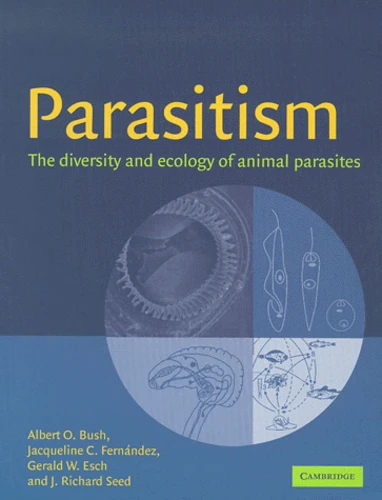Parasitism. The Diversity And Ecology Of Animal Parasites
Par : , , ,Formats :
- Paiement en ligne :
- Livraison à domicile ou en point Mondial Relay estimée à partir du 17 décembreCet article sera commandé chez un fournisseur et vous sera envoyé 17 jours après la date de votre commande.
- Retrait Click and Collect en magasin gratuit
- Livraison à domicile ou en point Mondial Relay estimée à partir du 17 décembre
- Nombre de pages566
- PrésentationBroché
- Poids1.375 kg
- Dimensions19,0 cm × 24,5 cm × 2,9 cm
- ISBN0-521-66447-0
- EAN9780521664479
- Date de parution05/04/2001
- ÉditeurCambridge University Press
Résumé
Parasitism in its many, sometimes subtle, guises is the most prevalent life style among organisms. Not surprisingly then, most organisms are exploited by parasites of one type or another. But what is parasitism and what are parasites? In this textbook, the authors describe parasitism as an ecological relationship. Ecology is the study of the relationship between organisms and their environment; what better definition can there be for the host-parasite relationship? The study of the host-parasite relationship differs markedly from studies on free-living organisms in one very important way - the hosts for parasites are alive and are thus capable of responding, positively or negatively, to the presence of the parasite. This feature alone weds such traditionally disparate disciplines as immunology and physiology with ecology and epidemiology! This textbook describes the diversity of the major eukaryotic parasites of animals, who they are and how they live. With a consideration of both pathology and regulation, it considers the impact that parasites have on their hosts (and, with a discussion of immunology, vice versa). It also includes chapters on parasite populations, communities, perpetuation, biogeography, and evolution emphasizing the ecological overtones of host-parasite relationships. Text boxes containing anecdotal, supplemental, and interesting observations and discussions pepper the book to bring the subject matter to life. Well illustrated and written in an easy, accessible style, Parasitism: The diversity and ecology of animal parasites represents a new and different approach to the study of parasitology.
Parasitism in its many, sometimes subtle, guises is the most prevalent life style among organisms. Not surprisingly then, most organisms are exploited by parasites of one type or another. But what is parasitism and what are parasites? In this textbook, the authors describe parasitism as an ecological relationship. Ecology is the study of the relationship between organisms and their environment; what better definition can there be for the host-parasite relationship? The study of the host-parasite relationship differs markedly from studies on free-living organisms in one very important way - the hosts for parasites are alive and are thus capable of responding, positively or negatively, to the presence of the parasite. This feature alone weds such traditionally disparate disciplines as immunology and physiology with ecology and epidemiology! This textbook describes the diversity of the major eukaryotic parasites of animals, who they are and how they live. With a consideration of both pathology and regulation, it considers the impact that parasites have on their hosts (and, with a discussion of immunology, vice versa). It also includes chapters on parasite populations, communities, perpetuation, biogeography, and evolution emphasizing the ecological overtones of host-parasite relationships. Text boxes containing anecdotal, supplemental, and interesting observations and discussions pepper the book to bring the subject matter to life. Well illustrated and written in an easy, accessible style, Parasitism: The diversity and ecology of animal parasites represents a new and different approach to the study of parasitology.

